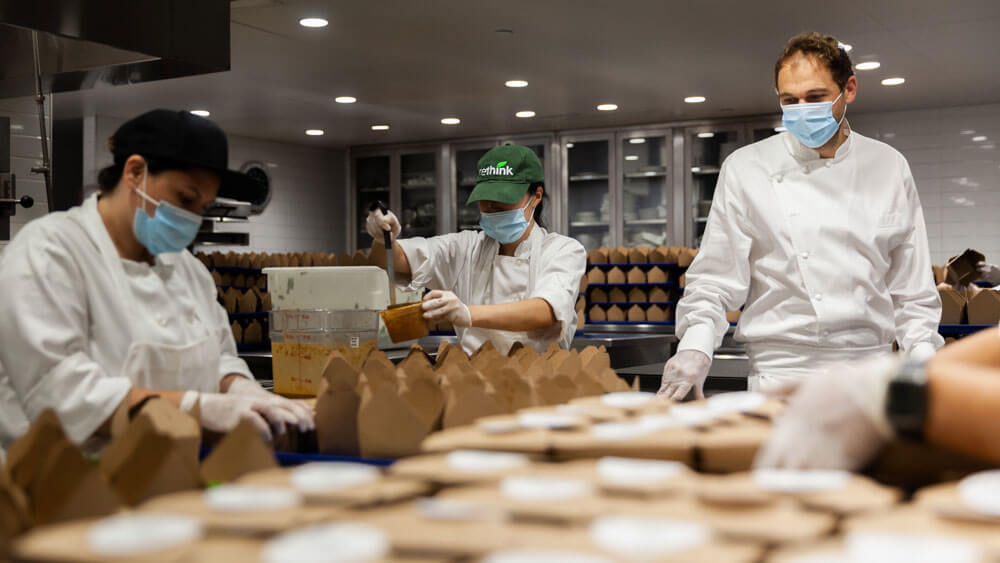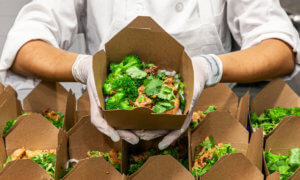
Chefs from the Michelin-starred restaurant Eleven Madison Park prepare meals for distribution to New Yorkers in need. (Photo courtesy Rethink.)
Restaurateur Danny Meyer, founder of the Union Square Hospitality Group (USHG), which includes the Michelin-starred Gramercy Tavern New York City and more than a dozen other restaurants, announced in July that he was bringing back furloughed culinary staff to prepare meals for residents of the South Bronx. Meyer is partnering with Rethink, a three-year-old New York City–based nonprofit dedicated to creating a more equitable and sustainable food system.
USHG will use the kitchens in two of its Manhattan restaurants and the catering kitchen at Union Square Events to prepare 125,000 meals for food-insecure New Yorkers, joining nearly 40 New York City restaurants that have shifted to cooking for those in need during the pandemic through the Rethink Certified program. Rethink, which was founded in 2017 by chef Matthew Jozwiak and provides funding through the program, has expanded to San Francisco and plans partnerships soon in Nashville, Chicago, and New Orleans. A similar program, The World Central Kitchen, a nonprofit founded by chef and restaurateur José Andrés, is active in 30 cities in the U.S. and has purchased more than five million meals from 2,300 restaurants, delivering them directly to Americans who need assistance.

Salads prepared by Eleven Madison Park chefs for food-insecure New Yorkers. (Photo courtesy Rethink.)
In the case of USHG, the commitment to serving meals to those who are in need won’t go away when the COVID-19 crisis is behind us, Meyer told The Washington Post — the restaurants will continue working with Rethink to feed people in the South Bronx for the long-term. Chef Daniel Humm, owner of the three Michelin-starred Eleven Madison Park in New York City and Rethink’s chief education officer, also has expressed his commitment to cooking family meals to feed New Yorkers post COVID -19. “I keep asking myself,” Hamm told Food & Wine, “Why aren’t we doing this all the time?”
In addition to food security, Rethink actively works to reduce food waste and to redistribute excess food from restaurants and other commercial kitchens — before COVID-19, Rethink fed 15,000 people a week by turning restaurant waste into meals. When the World Wildlife Fund conducted research into the problem of food waste in commercial kitchens, they found that one of the most pressing problems is the lack of connections between organizations like Rethink, which have the capacity to distribute food, and the restaurant and hotel kitchens where it is produced. Collaborations like the ones between commercial kitchens and their leaders and Rethink can close that gap. Since March, the nonprofit has recovered 300 tons of food and served thousands of meals.
Barbara Palmer is deputy editor at Convene.
This story is part of Convene‘s September CMP Series package on ways the world has changed since COVID-19 and what we hope will stick once the pandemic is behind us.
